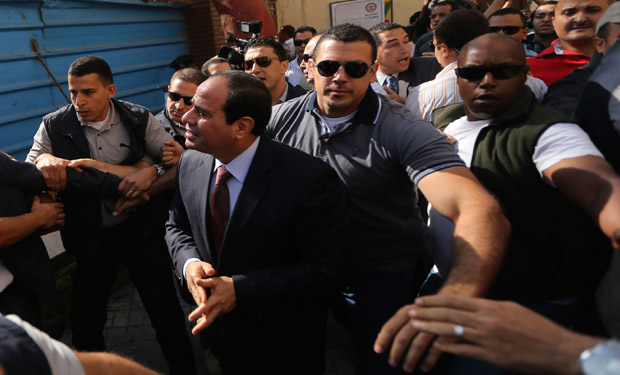Over the past few days, I have witnessed different scenes of the recent presidential elections in Cairo and Giza—those relating to the victorious presidential campaign of Abdel-Fattah El-Sisi and others relating to the struggling campaign of his challenger, Hamdeen Sabahy.
Accompanied by an Egyptian friend, I visited a polling station in Giza and witnessed with my own eyes the joy of voters—men and women, young and old—as they queued up to cast their ballots beneath the watchful eye of Egypt’s security apparatus, which was out in force to prevent any security violations. Outside the polling station, the song Bushret Khair (Good Omen) played on a continuous loop, reflecting the mood of Egypt’s electorate, while images of Abdel-Fattah El-Sisi adorned nearby walls and shop windows. Nasserite candidate Hamdeen Sabahy was nowhere to be seen—either on polling day or in the preliminary election results.
It was clear to me that Egyptians were celebrating Abdel-Fattah El-Sisi’s expected victory early, even while polling was still going on, on the last day of the elections. I could not have been more surprised when this festival spirit was spoiled by bitter complaints regarding voter turnout. Many people complained about the comparatively low number of people who came out to the polls to vote for the man who the majority of Egyptians view as a “savior.”
I could not move through the streets of Cairo without hearing one conversation or another about the low voter turnout and what it means. The final judgment regarding voter turnout has yet to be issued by the Presidential Election Commission; this is nothing to do with media scaremongering or “activists” tweeting that this polling station or that is empty. We must also bear in mind that there were more polling stations this time around, with the number increasing by approximately 30 percent from previous elections. Therefore, it is only natural that overt indicators of voter turnout—like long lines outside of polling stations—would be affected.
The fact of the matter is that Sisi won by a landslide, and the preliminary results indicate that close to 24 million Egyptians voted for him, securing him around 94 percent of the ballots cast. As for Hamdeen Sabahy, approximately 800,000 Egyptians voted for him, making up around 4 percent of the vote.
According to a statement from the Presidential Election Commission, preliminary results indicate that 25 million Egyptians voted in the presidential elections during the first two days of polling—the number doesn’t include those who voted on the third and final day. The number of Egyptians who voted for Sisi far exceeds the number of Egyptians who voted for either Muslim Brotherhood candidate Mohamed Mursi or faloul candidate Ahmed Shafiq in 2012. During the first round of the elections, Mursi won just 5,764,952 votes, while Shafiq secured 5,505,327 votes. In the runoff, Mursi won with 13,230,131 votes, hardly giving him the popular mandate the Brotherhood claimed. Sisi has secured 12 million more votes than Mursi.
These elections are different from the Mursi–Shafiq runoff in other ways. The Muslim Brotherhood and their supporters attempted to foil this year’s election process, purposefully not taking part in the polls, and the same applies to the “revolutionary” youth. But Sisi was able to overcome this with the backing of the rest of Egypt.
Sisi gambled on the Egyptian people and won. He now has to turn the Egyptian people’s dreams into reality. This will not be an easy task.
